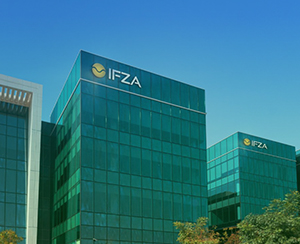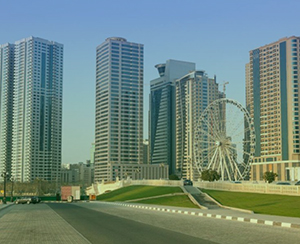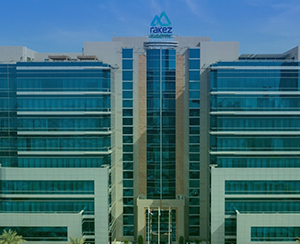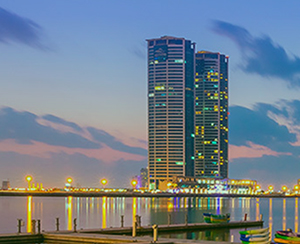Dubai is an attractive business hub for all budding entrepreneurs and investors. Dubai’s business-friendly environment attracts people from all walks of life. Dubai allows foreigners to establish and operate businesses, and it actively promotes overseas investment. In Dubai and across the UAE, foreign business owners can usually maintain complete ownership of their company while taking advantage of low corporate taxes and no personal income tax. Despite being able to obtain complete ownership of your company as a foreigner you may even choose to partner with a local sponsor if required. The local sponsor holds a certain percentage of your shares and can be of great benefit to you throughout the procedure and operation.
One of the most recent developments that draws even more foreigners to conduct business in Dubai is the long-term visa, which allows individuals to stay in the country for extended periods and even retire here after their careers. A flourishing economy, political stability, ease of launching a business, tax deductions, and quick processes are just a few advantages for foreigners establishing new ventures in Dubai and other UAE emirates.
The first and foremost thing you will need to do as a foreigner setting up a business in Dubai is to familiarize yourself with the local regulations and procedures to set up your business. You can get help from business setup consultants to make the process easier or you might also do it on your own.
Things to Get Familiar With When Setting Up a Business in Dubai
Jurisdiction
In Dubai, you may set up your business in either the mainland or the free zones. There are over 30 free zones in Dubai that offer several benefits for foreign entrepreneurs and investors.
You can trade both domestically and internationally when your business is based in Dubai Mainland. The establishment of a business is a very organized process.
For new firms, it makes sense to establish a business in a free zone. Dubai Media City, Dubai Silicon Oasis, Dubai International Financial Center (DIFC), Dubai Healthcare City (DHC), Dubai Multi Commodities Center (DMCC), and Jebel Ali Free Zone (JAFZA) are a few of the most well-known free zones in Dubai. However, because each free zone is overseen by a different authority, the guidelines and policies about enterprises as well as the timeframe for completing the necessary formalities may differ.
Company Structure
The company structure is one of the most important decisions you will make while establishing your venture in Dubai. This can influence various factors such as the business activities, the trade license type, the overall cost of the establishment, the nature of the business, etc.
The most common company structures in Dubai are:
Partnership:
A business owned by two or more people who share liabilities, gains, and losses.
Sole Proprietorship:
This is an ideal option for small enterprises since it allows one person to maintain control while taking on personal accountability.
Limited liability company:
A popular choice that offers flexible shareholding with two to fifty shareholders is the Limited Liability Company (LLC).
However, the different types of company structures in a Dubai free zone are:
- Free Zone LLC Company
- Free Zone Establishment
- Free Zone Branch
Types of trade licenses
Just like the company structure, you will have an array of options for the trade license too. The type of trade license usually depends on the company’s corporate structure and the business activity chosen. Here are some common types of trade licenses in Dubai:
Commercial license:
This is required for trading activities, such as import/export and the purchasing and selling of items.
Industrial license:
These are necessary for any manufacturing or industrial activity that involves the conversion of raw materials into final products.
Professional License:
Suitable for consultants, service providers, professionals, artists, and repair and medical services.
Perks of Starting a Business in Dubai as an Expat
Taxation benefits:
Mainland enterprises with taxable profits over AED 375,000 (subject to specific exemptions) are required to pay 9% Corporate Tax based on their fiscal year, in addition to 5% VAT. Free zones typically offer tax advantages; to be qualified for 0% Corporate Tax in a free zone, you must fulfill specific requirements.
Simple transfers in any currency:
There aren’t any currency restrictions in place at the moment to make transferring money simple.
Easy international trade:
Dubai offers first-rate seaports and airports for seamless international trade between Asia, Africa, and the Middle East.
Strategic Location:
For a company aiming to expand into foreign markets, Dubai offers a solid strategic regional location. The reason for this is that it acts as a gateway to both Asia and Africa.
A government that is friendly to business:
The government of Dubai makes this city business-friendly with policies that encourage business setup such as tax benefits, visa benefits, etc.
No territorial Barriers:
You can conduct your trading business without encountering any territorial restrictions, and you’ll also be able to reap the benefits of 100% capital and profit repatriation.
Extremely Diverse Economy:
The primary drivers of its growth are trade, technology, innovation, tourism, transportation, and petroleum products, in addition to natural gas reserves and petroleum products.
Low Crime Rate:
Living and working in Dubai is among the safest options available.
100% Foreign Ownership:
You can obtain 100% foreign ownership by registering your business in one of the UAE’s free zones.
Check out: Sharjah Free Zone Company setup
Documents Required to Establish a Business in Dubai as a Foreigner
Businesses founded within free zones are subject to the regulations set forth by the specific free zones. As a result, the paperwork needed will vary depending on the free zone where your application is submitted. Documentation that may be needed could consist of:
- Duly filled application form
- A copy of your current trade license or registration certificate, if appropriate (for local companies only if you are an established business).
- Business plan
- NOC from the current sponsor (If applicable)
- Signature of the designated Manager/Director for the new firm as well as the shareholder(s) of the company
- Copies of the passports of the designated manager or director and the shareholder(s) of the company
The Procedure for Setting Up a Business in Dubai as a Foreigner
- Select a business activity: There are many different activities available in Dubai free zones. It’s important to conduct a thorough study and select an activity that will work for your firm. The type of trade license you need to start your business in a Dubai free zone depends on the kind of business activity you choose.
- Select a trade name: To comply with local government laws, it is normally advisable to choose at least three trade names linked to your firm.
- Choose a location for your business: Although you may not need an office right away, picking a location for your business can help you better grasp the process and advantages. You can establish your company on the mainland as well as in one of the free zones in Dubai, such as the Meydan Free Zone, Jebel Ali Free Zone, RAKEZ Free Zone, and IFZA Free Zone.
- Select the kind of office: You can choose a physical or virtual office space for your operations in the free zone, depending on your needs. You can choose from a range of workplace choices offered by Dubai free zones.
- Document preparation: The documents needed for the procedure may differ depending on the kind of activity and zone you selected. This task may seem the most difficult, but it will become second nature once you get the hang of it.
- Acquire Prior Approvals: Depending on the business operations you choose, you might need to obtain various pre-approvals from the relevant authorities to move forward with the application process.
- Apply for a license to trade: You can establish your business and have all the rights to operate and transact within the designated jurisdiction if you have a trade license in Dubai. Your choice of business activity also influences the issuance of a trade license.
- Obtain the trade license: You are now ready to run your business after the trade license has been granted and issued to you.
- Create a corporate bank account: To handle the financial operations of your firm, you must create a corporate bank account when you set it up. Later on, when you need certain bank statements and references for additional business expansion, this will be useful.You can obtain employee, family, and personal visas; the number of visas granted will depend on your office’s size and other considerations.









